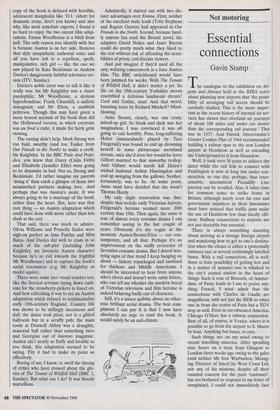Not motoring
Essential connections
Gavin Stamp
The catalogue to the exhibition on Air- ports and Airways held at the RIBA notes about planning new airports that 'the possi- bility of arranging rail access should be carefully studied. This is the more impor- tant as the recent history of internal air ser- vices has shown that overland air journeys of about 100 miles and under are slower than the corresponding rail journey.' That was in 1937. And Patrick Abercrombie's Greater London Plan of 1944 recommended building a railway spur to the new London airport at Heathrow as well as extending the Underground to it from Hounslow.
Well, it took over 30 years to achieve the latter while the rail link to connect with Paddington is now at long last under con- struction, so one day, perhaps, that inter- minable, intermittent Piccadilly Line journey can be avoided. Alas, it takes time for common sense to strike home in Britain, although surely even fat cats and government ministers in their limousines must have noticed that traffic jams make the use of Heathrow less than ideally effi- cient. Railway connections to airports are not just desirable but essential.
There is always something daunting about arriving at a strange foreign airport and wondering how to get to one's destina- tion when the choice is either a (potentially ruinous) taxi or several confusingly labelled buses. With a rail connection, all is well: there is little possibility of getting lost and in a matter of minutes one is whisked to the city's central station in the heart of things. Such is true of Brussels, of Amster- dam, of Paris; loath as I am to praise any- thing French, I must admit that the connections with Charles de Gaulle are magnificent, with not just the RER to whizz one in from the centre of Paris but a TGV stop as well. Even in car-obsessed America, Chicago O'Hare has a subway connection. Best of all, of course, is Venice, where it is possible to go from the airport to S. Marco by boat. Anything but buses, or cars.
Such things are on my mind owing to recent travelling miseries. After spending nine hours on a train from Glasgow to London three weeks ago owing to the gales (and neither Mr Ivor Warburton, Manag- ing Director of InterCity West Coast Ltd, nor any of his minions, despite all their vaunted concern for the poor 'customer', has yet bothered to respond to my letter of complaint), I could not immediately face any more long and late railway journeys. So, having to be in London in the morning, I tried easyJet — yes, that is how it is spelt — from Glasgow to Luton. And easy it was, as far as it went. But then the bus Journey in the morning rush hour in the rain from Luton Airport to Luton Station took over half the time it took to fly from Glasgow to Luton.
Never again. No airport without easy and efficient public transport — and that means trains — deserves to exist. Next time I think I shall try Ryanair from Prestwick to Stansted, as both are directly accessibly by rail. Gatwick had a connecting station on the adjacent main line to Brighton from the very beginning — which was 1936 and, over half a century later, the authori- ties at Prestwick noticed that the railway from Glasgow to Ayr runs right next door and so built an interchange station which is now flourishing. And the advantage of Stansted, of course, is not so much Norman Foster's much praised but really rather pointless high tech terminal building but the fact that trains from Liverpool Street arrive right underneath.
Anything but Glasgow to Heathrow. The Piccadilly Line in the rush hour is bad enough, but my real complaint is that the only sure way to get to Glasgow Airport in the early morning or late evening is a taxi, and that costs a monstrous £12. Yet Glas- gow wants to be an International Airport: but how can it be, without good public trans- port? In fact, after a boom in the 1980s, international traffic is ebbing away and the direct American flights are in decline. I am not surprised. And where are they going? To Manchester, which has the best rail connections of any airport in Britain. Manchester Airport is now the destination of trains from all over northern England and even from Edinburgh Waverley.
Recently, the Glasgow Herald has been full of correspondence about the decline of international traffic at the local airport, and what has emerged is the pathetic fail- ure of attempts to build a rail link. The busy railway through Paisley is only a mile or so away, yet Scotrail and the Strathclyde Passenger Transport Executive have com- pletely failed to build a spur although they claim to have tried. Local opposition in Renfrew has been the excuse, but that is not convincing. The real reason, I fear, is the car-mania of western Scotland com- bined with the power of the taxi drivers. And now, I suspect, it is too late. So Glasgow Airport will continue to decline, and perhaps that is right. Indeed, I rather think that it really ought to be returned to fields while fog-free Prestwick, hallowed by Elvis, should be Scotland's international airport and provided with rapid rail connections to every major city. But that, like anything that is sensible, is far too much to hope for. Meanwhile, I shall continue to prefer to go to London by train — if, that is, Mr Warburton answers my letter and refunds my fare.



















































































 Previous page
Previous page